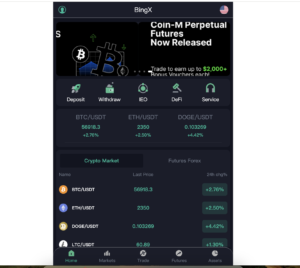Facebook Does Not Care About People Being Scammed on Their Site: Here’s How You Can Report Facebook Scam.
In the age of social media, Facebook has become one of the world’s largest platforms, with billions of active users. Its influence spans across various demographics, from teenagers to retirees. However, along with its power comes a dark side—Facebook has also become a breeding ground for scams, particularly crypto investment scams. Despite the numerous reports and complaints from users, Facebook appears to be doing little to stop this rising trend. This article will delve into the rise of crypto investment scams on Facebook, why Facebook seemingly doesn’t care about these scams, and how users can take action by reporting these incidents to ReportCoinScams.
The Rise of Crypto Investment Scams on Facebook
The allure of cryptocurrency lies in its decentralized nature, its potential for high returns, and its growing adoption across various sectors. Unfortunately, this makes it a ripe target for scammers. Over the last few years, crypto investment scams have surged, and social media platforms, particularly Facebook, have become prime hunting grounds for these fraudsters.
Facebook’s vast reach and its permissive advertising policies for financial products have opened the door for scammers to run sophisticated campaigns targeting unwary investors. These scams often promise astronomical returns, instant profits, or exclusive access to a groundbreaking new coin, drawing in people who are either new to cryptocurrency or are seeking to capitalize on the crypto boom.
What’s more troubling is the evolution of these scams. Initially, most crypto fraud on Facebook involved fake giveaways or phishing schemes, but they have now evolved into more complex investment scams. Scammers create fake profiles, impersonating trusted figures in the financial or cryptocurrency world. They also use deceptive ads that mimic legitimate investment platforms, creating a sense of urgency and legitimacy by fabricating testimonials from “successful investors.”
One such scam involves offering exclusive access to new cryptocurrency projects. Scammers claim that they have inside information about a soon-to-be-launched coin, promising returns that sound too good to be true. Once victims invest, their funds disappear, and the so-called investment opportunity vanishes along with the fraudsters.
Facebook’s Ineffective Response to Scams
Facebook has faced public criticism over its handling of scams for years. However, the company’s response to the rise of crypto investment scams has been lukewarm at best. While Facebook occasionally takes down pages, groups, or ads after users report them, scammers often reappear quickly under new accounts or with slightly altered tactics. This reactive approach leaves users vulnerable and does little to stem the growing tide of fraudulent activities on the platform.
One reason Facebook may seem indifferent to these scams is financial. Facebook earns significant revenue from advertisements, and many scam ads run through paid advertising channels. While Facebook claims to have policies in place to get advertisers, it is clear that these policies are not adequately enforced. Scammers can easily bypass Facebook’s checks by using a mix of fake identities, cloned websites, and deceptive imagery that makes their schemes appear legitimate.
In addition, Facebook’s algorithms are designed to prioritize content that drives engagement, and investment scams often create the kind of attention-grabbing content that gets shared widely. These schemes tap into fear of missing out (FOMO), exploiting people’s natural tendency to share lucrative-looking opportunities with friends and family. The more people engage with these posts, the more Facebook’s algorithm pushes them into users’ feeds. This creates a vicious cycle where scams continue to proliferate unchecked.
Lack of Accountability from Facebook
For years, Facebook has claimed that it takes scams seriously, but actions speak louder than words. The company’s lack of a robust system for addressing scam reports has left many victims feeling neglected. Reporting a scam on Facebook is often met with a standard, automated response. Even in cases where a scam is clearly identified, Facebook’s follow-up actions are inconsistent.
For many users, it feels as though Facebook only acts once the damage has already been done. Rather than proactively identifying and removing scams, Facebook waits for users to report them—and even then, the process is slow and inefficient. This reactive stance has created a breeding ground for fraudsters, who can easily adapt their schemes to avoid detection.
Moreover, Facebook does not appear to take responsibility for the financial losses incurred by its users. People who lose money to crypto investment scams on the platform are left to fend for themselves, often with no clear path to recovering their funds. This lack of accountability is particularly galling given Facebook’s substantial financial resources and its ability to implement more rigorous controls to protect users.
Why You Should Report Facebook Scams to Platforms Like ReportCoinScams
Given Facebook’s sluggish response to investment scams, users must take matters into their own hands. One way to combat this rising tide of fraud is by reporting scams not just to Facebook but to a dedicated scam reporting website named ReportCoinScams. This platform specializes in identifying and tracking cryptocurrency scams, providing users with a centralized place to report fraudulent activities, whether they encountered them on Facebook or elsewhere.
By reporting crypto investment scams to ReportCoinScams, victims can contribute to a growing database of scam reports, helping others avoid falling into the same traps. Platforms like ReportCoinScams also work with law enforcement agencies and financial regulators to help track down scammers and potentially recover lost funds.
Additionally, ReportCoinScams provides educational resources that can help users learn how to spot scams before they fall victim. By staying informed and vigilant, users can protect themselves from the ever-evolving tactics of fraudsters.
The Steps to Report a Facebook Scam to ReportCoinScams
Reporting a Facebook scam to ReportCoinScams is straightforward. If you come across a scam on Facebook, here are the steps you should follow:
- Gather Information: Take screenshots of the scam page, ad, or profile. Note down any relevant details, such as the names of individuals involved, the website links they provide, and the claims they make.
- Report to Facebook: While Facebook’s response may be slow, it’s still important to file an official report with the platform. This can be done by clicking on the three dots in the top-right corner of the post or ad and selecting “Report.” Choose “Scam or fraud” as the reason.
- Report to ReportCoinScams: Visit ReportCoinScams and fill out the reporting form. Provide as much information as possible about the scam, including any screenshots or evidence you collected. The more details you provide, the easier it is for the platform to track and investigate the scam.
- Share Your Experience: After reporting the scam, consider sharing your experience on social media or scam awareness forums. This will help raise awareness and prevent others from falling into the same trap.
- Stay Vigilant: Scammers often adapt quickly, so even if one scam is taken down, others will likely pop up. Always be cautious when encountering investment opportunities on Facebook, especially those that promise unusually high returns or seem too good to be true.
Conclusion
The rise of crypto investment scams on Facebook has exposed a troubling reality: Facebook does not seem to care about its users being scammed on their platform. Despite countless reports and the clear financial impact these scams have on individuals, Facebook’s response remains reactive and ineffective. The platform’s failure to proactively protect its users raises serious questions about its commitment to user safety.
In the face of Facebook’s inaction, it is up to users to protect themselves. By reporting scams to specialized platforms like ReportCoinScams, people can fight back against fraudsters and help create a safer online environment. While Facebook may not care, there are still ways to hold scammers accountable and prevent others from becoming victims.
________________________________________________________________________________________________

















